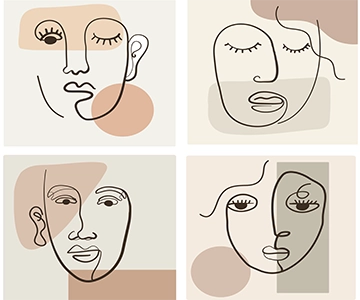Film Review: Babygirl from a Couple Therapist perspective
After being told by several people that I should watch Babygirl, I finally did and concluded that a mainstream film like this was long overdue!
Historically female sexual desire has been suppressed, or a mystery at best! Dating back to the early 20th century, when women were ‘treated' with a pelvic massage so they can release what we now know as an orgasm, to the 1950’s Stepford wives, where female sexual desire exists only in relation to men's need for sex, and where sex was seen as a duty to their husbands. We’ve come a long way and today there are various books such as Emily Nagoski’s ‘Come as You Are’ and more recently Gillian Anderson’s ‘Want’, a collection of female sexual fantasies. A film like Babygirl, illustrates that there is still work to be done around understanding and accepting the full spectrum of female desire.
In this blog, I will write from a couple therapists perspective and focus on the dynamic between Romy (Nicole Kidman) and her husband Jacob (Antonio Banderas). Babygirl’s opening scene illustrates the hidden nature of desire within the confines of a long term relationship. Nicole Kidman is in the female superior position, reaching, what we’re led to believe is her orgasm. Once her husband climaxes, he falls asleep and Romy sneaks out of bed, runs to another room and opens her laptop to watch BDSM porn and ‘complete the job’ unbeknownst to her sleeping husband. We later find out that she’s been faking orgasms for their entire 19 year marriage.
In other scenes, we see her dutifully acquiescing to his sexual advances, another role she plays in what is a highly performative life. She is the perfect wife, mother and a trailblazing career women in a male dominated industry. Interesting parallels are drawn between the warehouse robotics industry where she is the CEO and to the complexities of human nature. Robots are precise and predictable whereas humans are multifaceted and full of contradictions. This couldn’t be more true when it comes to sexual fantasies, where there are often opposing feelings and forbidden desires, fuelling their excitement. For Romy, her sexual fantasy is about putting everything at risk; ‘something has to be at stake’ she says. Romy has a high powered career with all the trappings of a successful life, yet there’s a hidden desire to throw it all away, relieving her of the burden of being a ‘performative robot’.
Central to the film is a torrid and risky affair with a much younger intern, Samuel. It would be predictable to think that she’s the woman in a position of power taking advantage of her intern, but this is turned on its head and she is submissive to him, allowing her to finally play out her deepest darkest fantasy: relinquishing the heavy burden of power, where if she’s found out she risks losing everything.
In another scene, we see Romy attempt to ask her husband to try sex in a different way. She hides herself under the sheets whilst telling him, then puts a pillow over her face and asks him to tell her what to do but, they find it difficult to get going. Eventually, he says he doesn’t like it because it makes him feel like a villain. Here we see a perfect example of how couples can get stuck in rigid sexual scripts, they typecast each other making it difficult to break out of those roles. In addition, Romy feels too ashamed to tell her husband what she really wants. The shame of believing that she’s not normal for having BDSM sexual fantasies keeps her from opening up to him. She has suppressed these desires for so long that when released, they are enacted in a destructive way (the affair with her intern), therefore confirming her belief that these desire are dangerous. This highlights the importance of communication between couples but sadly, just when she is finally able to be vulnerable and open up to Jacob, he reacts negatively, tells her to move out and shuts down any further communication.
Shame thrives in secrecy and the antidote to shame is to talk about it. At the end of the film, we see an empowered Romy stand up to a colleague who’s trying to take advantage of her by hinting he knows about the affair (which at this point is over), she responds ‘if I want to be humiliated, I’ll pay someone to do it, now FUCK OFF’. The colleague represents shame and she’s just stamped it down by owning her desires.
In my work as a couple therapists, I’ve heard people say that it can feel easier to ‘try on’ a different character with someone new, who’s unencumbered from life’s domesticities, this is clearly one reason affairs are so common as well as consensual non-monogamy. You would think that people in long term relationships would choose the safety of their coupledom to take risks by trying out new parts of themselves in the bedroom, but for many of us there is a struggle to integrate safety and adventure. Esther Perel writes emphatically about this paradox within marriages in her seminal book ‘Mating in Captivity’. She asks how we can introduce some level of adventure/risk within the confines of our closest, most loving relationships. Interestingly, when exploring BDSM with Samuel, Romy chooses her safe word to be her husbands name, Jacob. He is her safe person. I think most of us would like to agree that our partners are the ones who’ve ‘got our backs’, so for Romy it would make perfect sense to protect her safe haven from what she believes are abnormal, shameful and potentially destructive sexual desires.
In the end we see that Romy and Jacob have been able to work through the disclosure of the affair, (in my version this happens with the help of a couple therapist!), and they are able to have more fulfilling sex that incorporates her true sexual desires. This sex scene is intertwined with a scene of Samuel stroking a dog. The dog and Samuel are introduced to us early in the film, during an interesting scene outside the office on a busy street. The aggressive dog is causing a panic and charges towards Romy, until Samuel whistles to catch the dogs attention and tames it with a cookie. The dog illustrates Romy’s wish to be powerless like a pet, where she can be looked after rather than having to look after everyone else around her, where she can role play being told what to do and be a ‘good girl’ and not have to carry the heavy burden of real life responsibilities.
After writing this blog, I decided to watch Nightbitch (another film that’s been on my 'must watch’ list) and I couldn’t help but notice a curious theme of women and dogs. Perhaps it’s symbolic of our desire to connect to something primal and instinctive that has been since been domesticated yet still has that untamed wild animal within.



